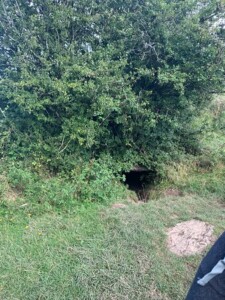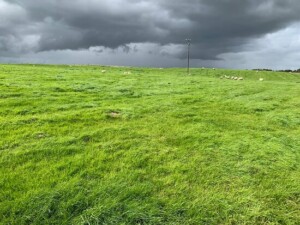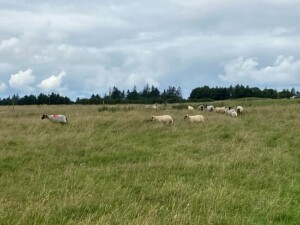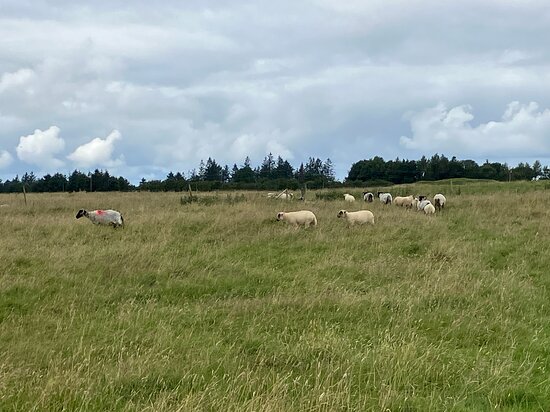What was the challenge/ problem that was addressed? Why is it important for partnership to solve the problem?
Rathcroghan is a well-preserved prehistoric and medieval archaeological landscape located in rich agricultural pasture in Co. Roscommon. The complex of archaeological sites in the area are on the Department of Culture, Heritage and the Gaeltacht tentative list for UNESCO World Heritage Status (Royal Sites of Ireland) in recognition of their national and international significance. The Rathcroghan area and its surrounding areas are experiencing socio economic decline however, with pastoral farming systems combined with the weak economy of its hinterland increasing the vulnerability of farming in the area and of the valuable landscape farmer’s care for. This tension between the desire and indeed the statutory requirement to protect archaeological heritage whilst earning a living from the land is the primary challenge faced by the Rathcroghan farming community.
How did you solve the problem? (Or if your practical case is still in progress how are you solving the problem?)
This project is still ongoing and aims to improve the socio-economic circumstances of farming in Rathcroghan whilst also conserving and enhancing the internationally significant archaeological landscape through the deliverance of interventions which provide co-benefits for a range of services, including biodiversity, carbon sequestration and water quality. To achieve these goals, the project will pursue the following specific objectives:
(i) Manage the Rathcroghan landscape in a sustainable way with a focus on the delivery of good archaeological condition;
(ii) Devise a system of dynamic access routes through farmland to the Rathcroghan archaeological monuments;
(iii) Increase awareness and recognition amongst members of the general public of the significance of Rathcroghan as a farmed archaeological landscape and of the central role of farmers in caring for the Rathcroghan living landscape.
What is innovative in your practical case? (e.g. technological innovation, new product or services, market
innovations, social/organizational innovations etc.)
(i) Manage the Rathcroghan heritage site landscape in a sustainable way with a focus on the delivery of good archaeological condition;
(ii) Devise a system of dynamic access routes through farmland to the Rathcroghan archaeological monuments;
(iii) Increase awareness and recognition amongst members of the general public of the significance of Rathcroghan as a farmed archaeological landscape and of the central role of farmers in caring for the Rathcroghan living landscape.
Unexpected failures, if any.
Inability to strike an effective balance between the socio-economic improvements for farming and the conservation efforts for the archaeological landscape and ecosystem services. We could have focused more on community involvement or consultation in decision-making processes, it might have lead to misunderstandings, lack of ownership, and failure to garner support for project interventions.
Lessons learned.
Improved Agricultural Practices: Participants learned about adopting more sustainable and environmentally friendly agricultural practices. This involved methods that enhance soil health, reduce chemical inputs, or optimise land use while considering the preservation of the archaeological landscape.
Enhanced Biodiversity Knowledge: Participants gained a deeper understanding of local biodiversity, including native species, habitats, and their ecological roles. This knowledge helped in implementing measures to protect and promote biodiversity within the farming landscape.
Understanding Carbon Sequestration: Learning about practices that contribute to carbon sequestration and greenhouse gas mitigation is crucial.
Water Quality Improvement: Implementing measures to enhance water quality by reducing runoff, soil erosion, or implementing natural filtration systems. Participants learned about the interconnections between land use, agricultural practices, and water quality.
Heritage and Archaeological Preservation: Increased awareness and understanding of the historical and cultural significance of the archaeological landscape.
Community Engagement and Collaboration: Learned to work in multi-actor projects fosters collaboration and communication among different stakeholders.
Economic Diversification and Resilience: Explored opportunities for diversifying income Participants discovered new avenues for revenue while maintaining environmental sustainability.
Monitoring and Evaluation Skills: Developed skills in monitoring and evaluating the impact of interventions on socio-economic conditions, biodiversity, carbon sequestration, and water quality. This involved data collection, analysis, and adapting strategies based on the results obtained.
Policy and Advocacy Skills: Better understanding of the policy landscape related to agriculture, heritage preservation, and environmental conservation. Participants learned to advocate for supportive policies or regulations based on their project experiences and findings.
These learning outcomes contribute not only to the success of the Farm Rathcroghan project but also to the broader knowledge base of sustainable farming practices, heritage preservation, and ecosystem conservation that can be applied in similar contexts or shared with other communities and projects.
What role does the advisor or advisory service play within your practical case?
1. Technical Guidance: Teagasc provides technical expertise and guidance to farmers in implementing sustainable agricultural practices that harmonise with the archaeological landscape.
2. Training and Education: Teagasc contribute to organised training sessions, workshops, and educational programs for local farmers. These sessions generally focus on best practices for land management, emphasising the co-benefits of sustainable farming for both agricultural viability and landscape preservation.
3. Collaborative Initiatives: Teagasc collaborate with local farmers, stakeholders, and relevant national bodies to develop innovative and practical management solutions tailored to the Rathcroghan area. T
4. Awareness Building: Teagasc assist in increasing awareness among the farming community about the significance of Rathcroghan as a farmed archaeological landscape. This involves disseminating information, organising field visits, and highlighting the central role of farmers in conserving this valuable heritage.
5. Support System Development: Teagasc assists in devising a robust support system or network that facilitates communication and collaboration between farmers, the National Monument Service, state agencies, and other relevant stakeholders. This network helps implement and monitor the management regime effectively.
6. Practical Implementation: Teagasc advisors work directly with farmers in implementing sustainable farming and archaeological practices. 


For sharing the experience on the good practice, please contact
Kieran Kenny,
kieran.kenny@teagasc.ie
